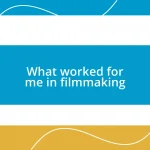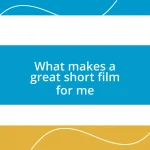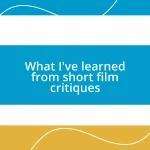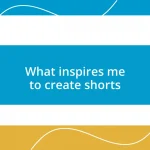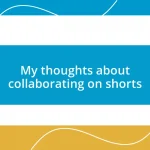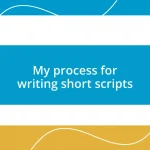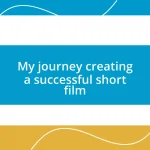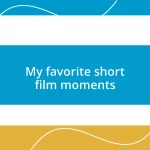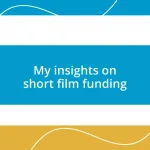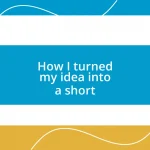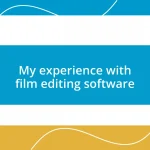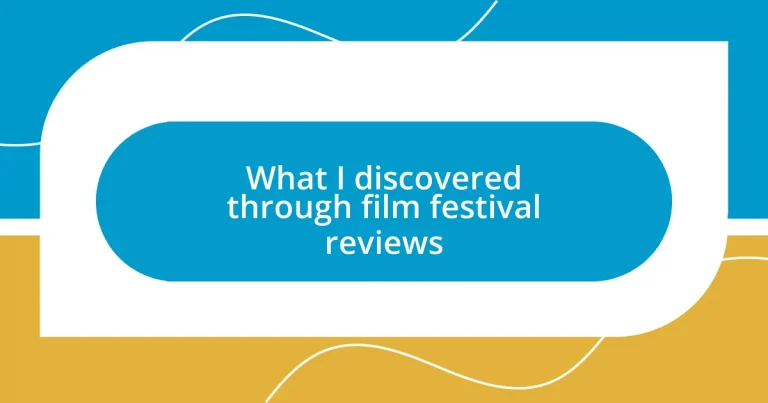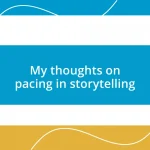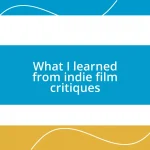Key takeaways:
- Film festival reviews serve as valuable guides that enhance the viewing experience by uncovering hidden gems and connecting themes to personal narratives.
- Analyzing audience reactions offers insights into emotional impact, community bonding, and diverse interpretations of films showcased at festivals.
- Understanding critic perspectives enriches appreciation of films by revealing deeper intentions behind creative choices and encouraging personal reflection on one’s own viewing experience.
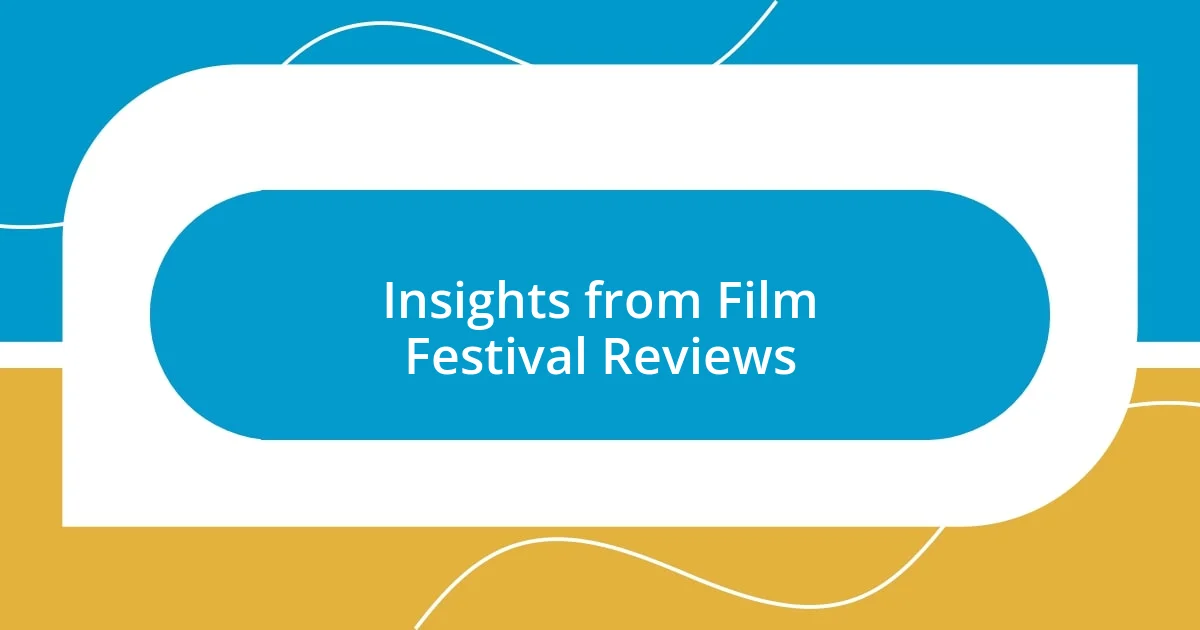
Insights from Film Festival Reviews
Film festival reviews are like treasure maps; they guide us to hidden gems that we might overlook otherwise. I remember attending a festival a couple of years back, where a review sparked my curiosity about an unconventional documentary. I took a leap of faith, and that film turned out to be a life-changing experience, expanding my perspective on the world. Isn’t it fascinating how a few well-placed words can lead us to such profound revelations?
Through the reviews, we also begin to understand the pulse of cinematic trends. I often find myself reflecting on how filmmakers respond to societal issues – it’s as if the reviews are a window into the zeitgeist. Have you ever noticed how a film’s themes resonate more with you when you read a reviewer’s passionate insights? It’s like they articulate emotions and experiences that we might not have recognized on our own.
Moreover, film festival reviews often reveal the behind-the-scenes stories that breathe life into the art. I remember reading about the challenges a director faced during production; it wrapped me in their journey, making me appreciate the film on a deeper level. Who wouldn’t want to celebrate the hard work and creativity that goes into crafting a story? These insights keep the conversation going long after the credits roll.
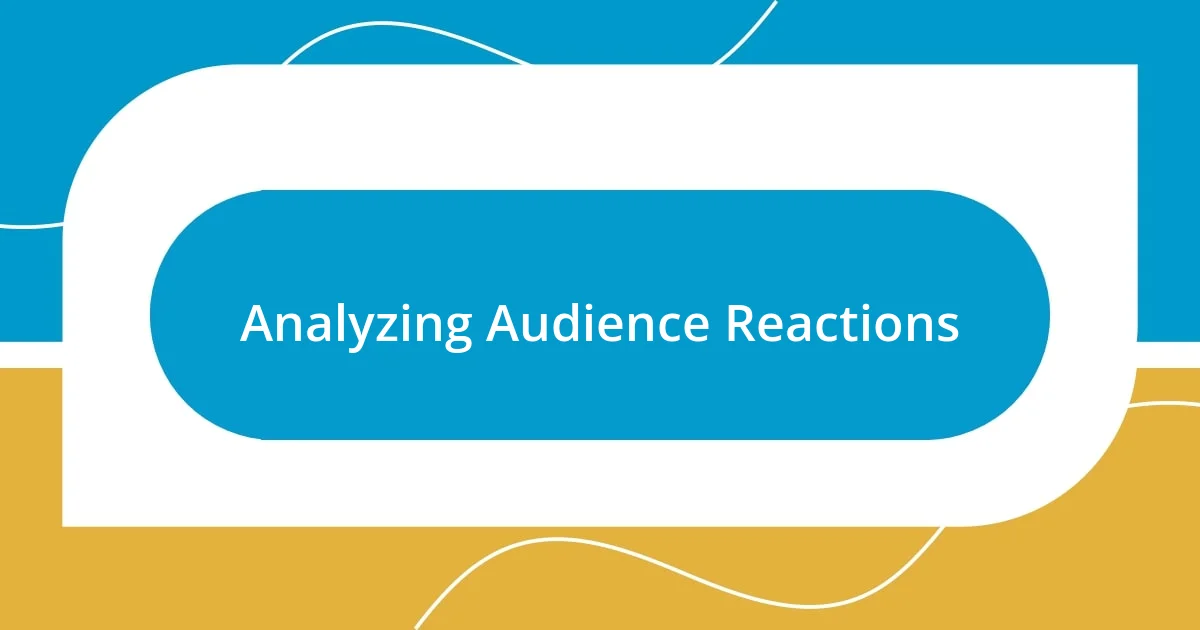
Analyzing Audience Reactions
Analyzing audience reactions at film festivals is often like being in a living laboratory of emotions. I remember one screening where the entire audience seemed to hold its breath during a pivotal scene. The collective gasp that erupted was electric, transforming the venue into a shared space of vulnerability. It’s enlightening to witness how a film can create such an instantaneous bond among strangers, revealing that the art of storytelling is, at its core, a communal experience.
Here are a few observations that arise from analyzing audience reactions:
- Laughter and Tears: The emotional responses such as laughter, gasps, or even tears often signal a film’s impact, indicating that it has touched something deep within the viewers.
- Silence Speaks Volumes: Sometimes, the silence after a poignant moment tells you more than applause ever could. It shows that the audience is processing what they’ve just seen.
- Post-Film Discussions: Conversations that erupt as the credits roll can reveal how different scenes resonate with individuals based on their personal experiences, sparking diverse interpretations.
- Audience Demographics: Noticing who laughs, cheers, or reacts can provide insight into the film’s reach and how effectively it communicates across different groups.
These reactions not only shape the atmosphere of the festival but also provide clues about the broader cultural significance of the films being showcased.
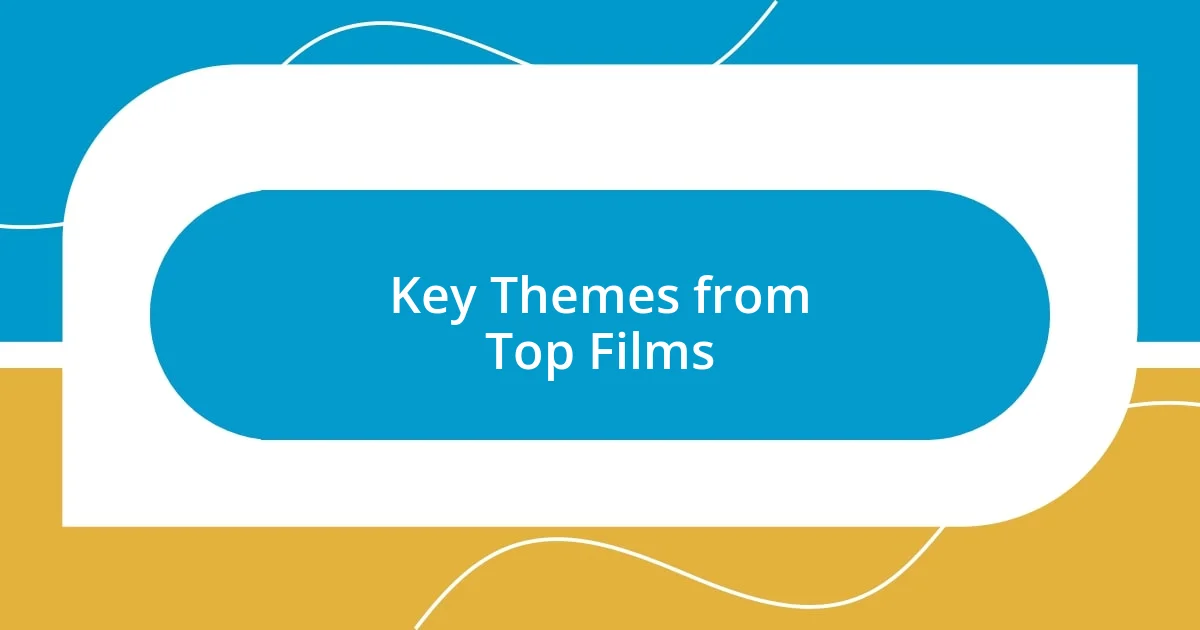
Key Themes from Top Films
When delving into the key themes from top films showcased at festivals, I often find recurring motifs that resonate deeply with audiences. One common element is the exploration of identity and belonging. I remember watching a film that tackled the complexities of cultural identity in a globalized world. The protagonist’s journey mirrored my own experiences of finding a place where I truly belong, sparking a wave of introspection within me. This theme often prompts viewers to reflect on their personal narratives, creating a powerful connection between the film and their lives.
Another theme that stands out is the resilience of the human spirit. A particular film about overcoming adversity struck a chord with me—its portrayal of strength in the face of hardship was both uplifting and heart-wrenching. I could feel the emotions wash over me as the characters faced challenges I couldn’t help but relate to. It’s incredible how films can encapsulate such feelings and drive home the message that we all have the capacity to rise above our circumstances, no matter how daunting they may seem.
Lastly, many top films at festivals tackle social justice issues. A recent documentary I viewed shed light on systemic injustices that I hadn’t fully considered before. Hearing the personal stories shared on screen opened my eyes to the struggles faced by marginalized communities. It made me realize how crucial it is for filmmakers to highlight these voices, promoting empathy and understanding within society. By weaving these themes into their narratives, filmmakers guide us toward greater awareness and action.
| Theme | Example |
|---|---|
| Identity and Belonging | A protagonist navigating cultural complexities reflects on personal identity. |
| Resilience of the Human Spirit | Characters overcoming adversity illustrate the power of perseverance. |
| Social Justice Issues | A documentary highlighting systemic injustices raises crucial societal awareness. |
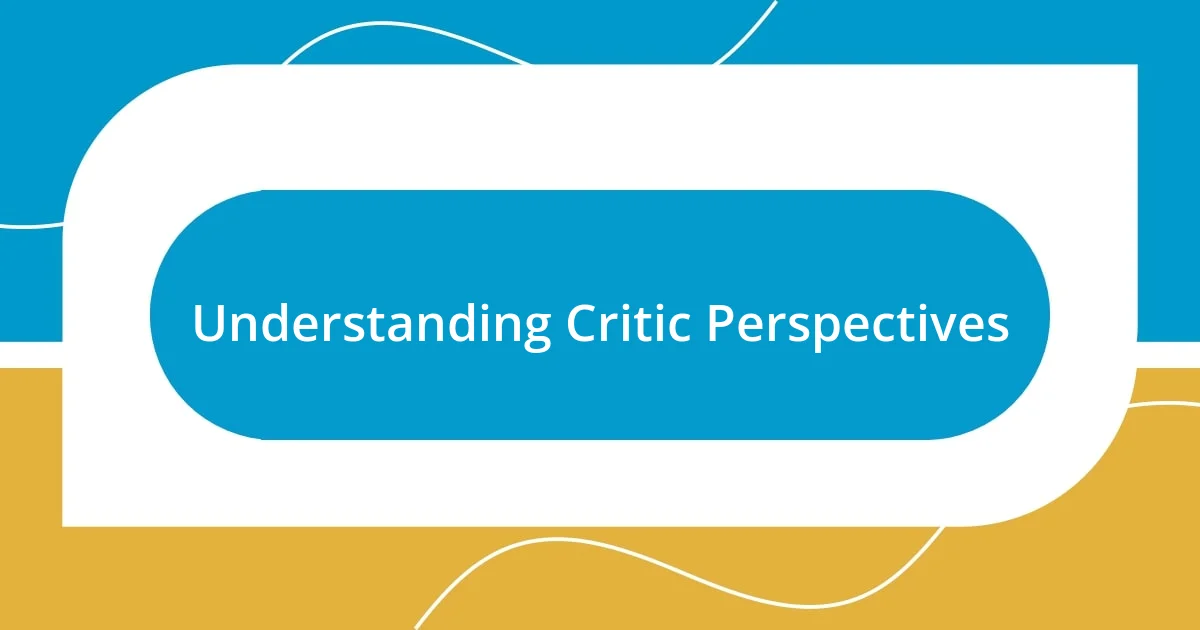
Understanding Critic Perspectives
Understanding the perspectives of critics can significantly deepen our appreciation of films. I’ve often found that a critic’s review is akin to peering into their emotional landscape; it reveals not just their thoughts but also how those thoughts resonate with broader societal themes. For instance, I vividly recall reading a review that dissected a filmmaker’s use of silence in a particular scene. It made me rethink how often we overlook the power of quiet moments in storytelling—something that can resonate deeply with viewers who may feel unheard in their own lives.
Critics don’t just evaluate films; they delve into the intention behind creative choices. I once read a poignant analysis of a film that juxtaposed vibrant colors against stark realities. The critic explained how this technique mirrored the dissonance between hope and despair, which struck me as a profound observation. It prompted me to reflect on how such contrasts can affect my perception of a narrative. How often do we miss these layers when we watch a film casually, without the lens of critical analysis?
Engaging with critic perspectives allows us to unearth the emotional truths embedded in cinematic storytelling. When a critic articulates their delight or disappointment, it can echo my own feelings, creating a sense of resonance. I remember the thrill of discovering a critic who championed a lesser-known indie film that I absolutely adored; their words articulated the very essence of why I connected with that film. This experience made me realize that, at its best, criticism can illuminate the pathways between our personal experiences and the artistic expressions we encounter on screen.
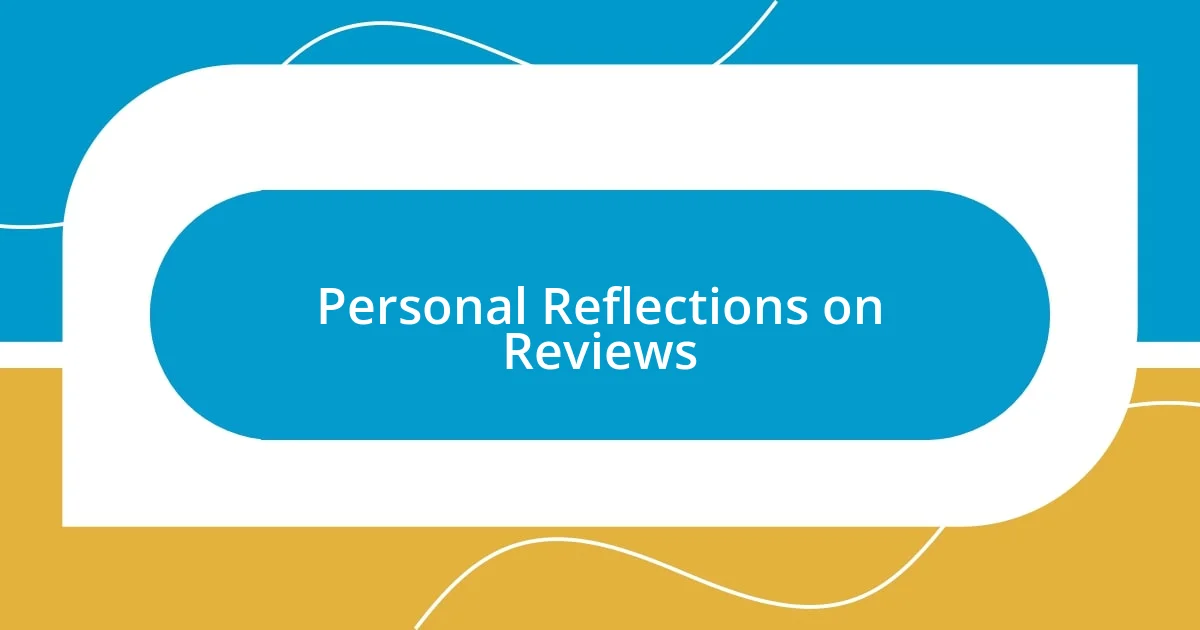
Personal Reflections on Reviews
Reflecting on film reviews often brings me to the realization of how subjective our interpretations can be. I recall a review I stumbled upon that critiqued a widely praised film, arguing that it was overwhelmed by over-explanation. Initially offended, I later revisited the film and discovered the wisdom in that perspective. It’s fascinating how a simple shift in viewpoint can change the entire experience of a film, isn’t it?
I’ve also found that my emotional responses sometimes clash with the consensus from critics. A gripping drama I adored was met with lukewarm reviews, leaving me pondering whether I was missing something fundamental. I remember feeling a bit isolated, as if my affection for the film set me apart from the mainstream. It led me to question: does our personal history shape how we connect with narratives? I realized that my unique experiences give me a lens through which I view stories, often leading to different conclusions than those of others.
Engaging with different reviews allows for a richer understanding of a film’s impact. For instance, I came across an enthusiastic review praising the use of a particular song to evoke nostalgia. That resonated deeply with me as I had similar experiences tied to that song, bringing back vivid memories of my childhood. How incredible is it that a single film choice can forge connections across vastly different audiences? By diving into reviews, I’ve learned that every viewer carries their own stories, making each reaction valid and unique.
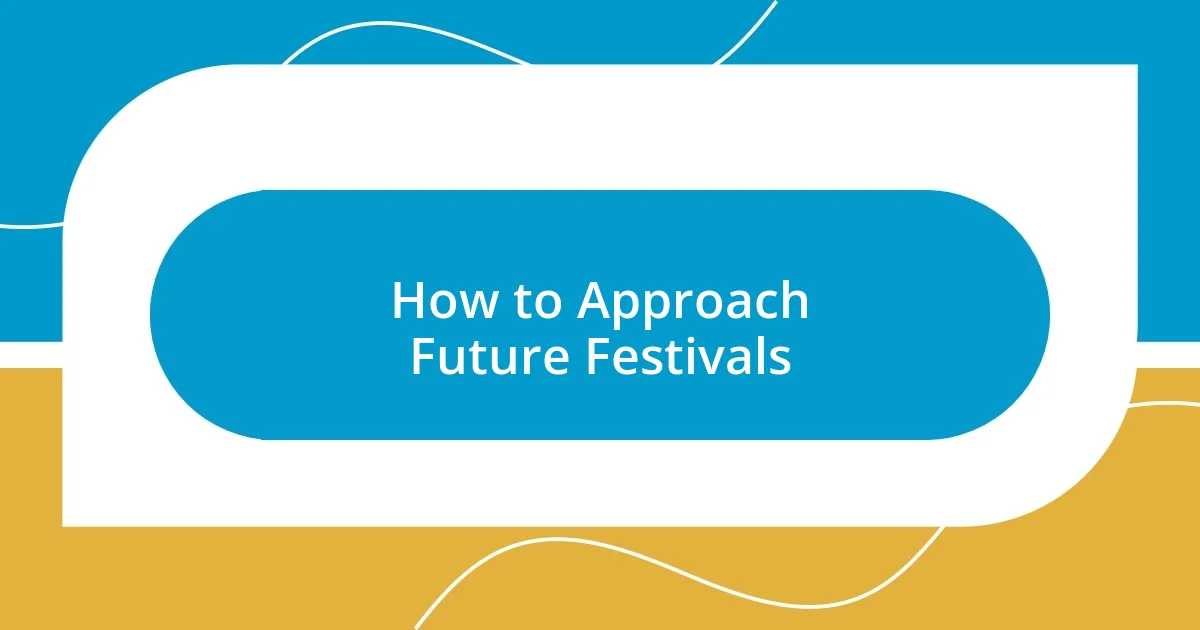
How to Approach Future Festivals
When approaching future festivals, I can’t emphasize enough the importance of research. Diving into the festival’s history—its cinematic focuses, past award winners, and what types of films make it into the lineup—can really shape your viewing experience. I remember attending a festival that specialized in documentary features; by the time I arrived, I had a list of must-see films, so I wasn’t overwhelmed by the choice.
It’s also helpful to connect with other attendees. I once struck up a conversation with a fellow festival-goer in line, and we ended up trading recommendations that transformed my entire visit. Have you ever left a festival feeling like you missed out on hidden gems? By sharing insights with others, you not only elevate your own experience but also create a sense of community, which is what film is all about.
Lastly, don’t shy away from spontaneity. Some of my best festival memories came from films I had never heard of but decided to see on a whim. There’s something exhilarating about embracing the unknown, isn’t there? When I reflect on it, those surprise hits often became my favorites, reshaping my understanding of genres or styles I thought I didn’t enjoy. So, be open, explore, and let the festival guide your cinematic journey.
